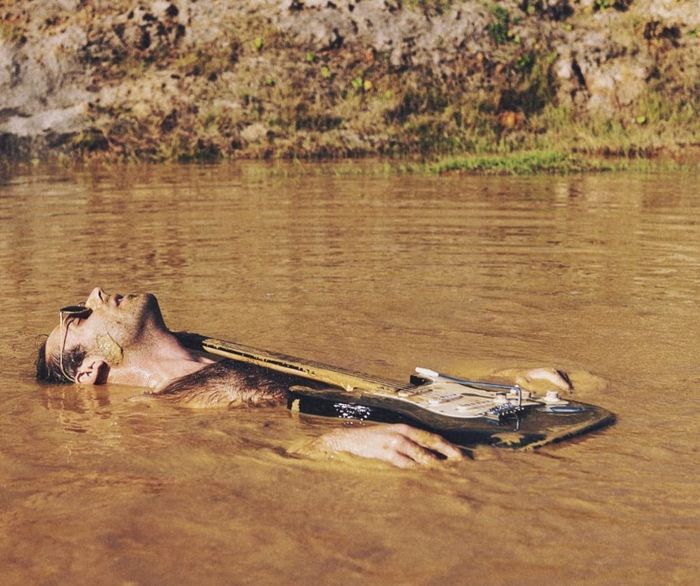An interview with Steve Hackett: surrendering silence and seconding out
David Cotter catches up with Steve Hackett, former lead guitarist of Genesis and fresh from the relase of latest solo album Surrender Of Silence, to discuss spontaneity, revisiting the past, and the thrill of live shows

Steve Hackett: I’m run off my feet, dashing about like a lunatic. Preparations are always crazy. Everyone wants everything in 5 minutes, which can’t possibly be delivered.
David Cotter: That’s the modern age. People expect instantaneity.
SH: The modern world is like a hungry child.
DC: Well, there won’t be any tantrums today.
SH: Sometimes I do have tantrums on tour, and that goes hand in hand with exhaustion.
DC: Especially in hot weather.
SH: I don’t mind the hot weather. Quite nice after the relentless grey. I think colour is preferable, personally…
“The recreation of what was spontaneous is part and parcel of what rehearsal requires”
Steve Hackett and I last met up in 2019, at Karma Sanctum in Soho, a place of (relative) quiet and respite amidst the hustle and bustle of the West End. Since then, lockdowns made most forms of musical and social activity rather difficult. This consummate creator, however, with over 25 solo studio albums to his name and a mythic legacy as the lead guitarist of Genesis from 1971 to 1977, has been busy, overwhelming so.
I want to hear all, but the endlessly interested, always outwardly-looking, and selfless gentleman that is Mr Hackett wants to catch up with my latest research first. It is nine thirty in the morning, and Steve has a frenetic day ahead of him, but the ancient Greeks, the kithara, and the collaborative guitar are suddenly top of his breakfast menu…
SH: The percussion instrument suddenly became something else! With the modern marvel of sustain and distortion and all the rest.
DC: And to think that classical guitar practice is now influenced by electric guitar practice.
SH: It’s funny. Rethinking and reinterpretation. Guitar ensembles doing toccata and fugue. 30 rock guitarists doing what one man could do on a keyboard in the first place. 30 guitarists doing what Bach could do in an afternoon.
DC: Indeed, all bowing down to the master. In any case, the plurality of music-making at the moment is simply amazing.

DC: Despite the madness of the last two years, how have you been?
SH: It’s been a hugely creative time. Challenges and adversity turned everyone inwards. For me, it meant that I just increased recording output accordingly. There was a live album [Selling England By The Pound & Spectral Mornings: Live At Hammersmith]. There was an autobiography [A Genesis in My Bed]. There was all this in the last 18 months or so. There was an acoustic album, a so-called acoustic album, called Under A Mediterranean Sky. There was a so-called rock album, called Surrender Of Silence. It’s been crazy busy, and I’m rehearsing a band now. The recreation of what was spontaneous is part and parcel of what rehearsal requires. It’s a memory test. But there is something else. Spontaneous attraction has also been fun to address. Not all of it is just doing things by rote. I did change things around.
DC: There’s the tension between order and chaos. You need to set a level of order to keep an ensemble together, and then, from that, you can allow yourself that creativity.
SH: Yes, I think so. Knowing what the dive is, is the first thing. Then you jump off the springboard and surprise yourself. I think I’ve sort of exhausted the possibility of memory at this point in time. We’ll just see what live gigs bring. It’ll be different.
DC: Absolutely. You rely on the audience for so much. Their behaviours influence how you perform night to night.
SH: They play you.

DC: Have you changed your approach to recording the new album because of Covid? Have you been doing lots at home?
SH: Yes, lots of stuff at home. I think it’s angrier. It’s closer to heavy metal, but it’s also got orchestral overtones. You’ve got this metal macabre coming out. Lots of social comment. A very densely packed album. It’s hardly romantic. I think I save all the romance right to the very end: A tiny track called “Esperanza” which uses, I’m gonna call it Spanish guitar rather than classical, and some strings, to conjure something that Chopin might have approved of, and I like that. I like the idea that you can strip it all away, and have something very basic, and very bare, and something that doesn’t rely on rhythm. Whereas the album is very rhythmic. Sometimes I think it’s music for wrestling matches. Here comes the big bruiser! Here we are!
Following a discussion with Steve about the reciprocal process within the band of sharing influences and naming tracks together, I ask whether the song titles are indeed mostly a product of collaboration.
“Two ways of interpreting life. Either there’s a point to it, or it just happens by coincidence”
SH: “Relaxation Music For Sharks (Featuring Feeding Frenzy)” was my title. I didn’t borrow that from anyone. It just struck me, having visited the London Aquarium where sharks were circling an Easter-Island-head lookalike, that they looked very relaxed. There was actually a diver swimming round and taking considerable chances. But I imagine what would happen if it went to the next stage of them reverting to type. Also, the idea of fish turning themselves into a bait ball. They form a circle to stop themselves from being picked off by sharks below and birds from above. You don’t want to be in that situation. It’s extraordinary the way life works. It’s either chaos or design. Two ways of interpreting life. Either there’s a point to it, or it just happens by coincidence. Whether that coincidence is meaningful or not, you have to consult Mr. Jung or the I Ching. Delve into synchronicity and individuation, and its derivations from Eastern philosophy.
DC: Absolutely. Buddhist philosophy. Tao.
SH: Yes. Nowhere to go but backwards. Or inwards. That’s the thing that’s most astounding when someone borrows heavily from the past. That’s what qualifies physicians, shrinks, artists…
DC: I think it was Auden who said that an artist spends the first half of their life copying others, and the second half copying themselves.
SH: That’s it! Auto-referential thematics. It’s a difficult area. One’s got to look outside oneself, else it’s “OH HERE COMES ANOTHER ONE OF THOSE”. To some degree, we’re all forced into that, even the most creative artists, because style does tend to rule at the end of the day. Because you need to come up with something. Because you are a professional. Because you have deadlines.
DC: Thinking about this Seconds Out tour, how do you balance being faithful to the original song versus putting that Steve Hackett 2021 sound on it?
“I’m looking forward to doing shows, because then sound gets a chance to breathe”
SH: Everything gets changed. It’s not necessarily my decision. These things come about in group therapy. Let’s put it this way. I’ve got a singer who says, “I’m struggling to reach the notes on “Squonk”. Can we change the key?”. So I said, “Yep, okay, we’ll take it down a tone”. Funnily enough, I’ve just seen a recording of Jo doing this in rehearsal. But it was lovely to be able to see it all fall into place. It sounds fine in that key, but I was worried that it wouldn’t. In a rehearsal room, the only thing I can really hear is the drums because, acoustically, they’re absolutely deafening. If I really want to make myself heard against that (if I’m not wearing in-ear monitoring, and I’m the only member of the band who doesn’t) I’ve got to turn up very very loud indeed.

But I’m kind of old fashioned. I like to hear what’s coming out of speakers and amps. I don’t want to hear much through a little thing in my ear. Guitars don’t work that way for me. I need to be able to get some sense of proportion. I’m looking forward to doing shows, because then sound gets a chance to breathe, rather than being squashed into a small room.
DC: Am I right in thinking this will be the first time you’ve performed “Robbery, Assault and Battery” outside of Genesis?
SH: I haven’t played it since 1976. Or was it 1977? Yes, first time that I’ve played it for nearly 50 years. It’s hardly got a guitar part at all. It really is a keyboard invention, in every sense of the word. I’m doing that one as it’s part and parcel of Seconds Out, embracing the totality of that album and doing full-length versions of everything, rather than segwaying: here’s a cheeky-chappy nod to the past, but not really…
DC: This is what all the real fans want. They want to hear the pieces in full.
SH: I adopt a completist mantra. I’m looking forward to that, and doing the new stuff as well, although some of it will still be absolutely terrifying in terms of being on-form and match-fit. Memory. Speed of delivery. “Held In The Shadows”: I can’t work out if it’s a love song masquerading as a rock song, or a rock song pretending to be a love song.
DC: Maybe some days it will be more like a rock song, and other days more like a love song?
SH: That’s it. Depending on all those external factors. I’m looking forward to it! Every band I have ever known, and every band I have ever encountered (whether it’s our own or someone else’s), they all say with early shows “I think we got away with it! You can’t possibly catch all of the spinning plates that are in the air”.
DC: That’s what makes it so exciting. That’s the chaotic element. I love it.
SH: Once we’re no longer holding onto the coattails of Covid, we can sit down in Soho again, and reflect on all this, and say, hopefully, what an interesting time this all was. Right now, we’re making sandwiches for the band. It’s subsistence level. That’s touring. Packing up the tent and off we go.
DC: The bread and butter of the situation.
SH: Let’s do this again, in the flesh, soon. Good luck with all things guitar, and here’s hoping it’s not just a thesis, but a book, or two. Always remember, you are working for yourself and not others.
Surrender Of Silence is OUT NOW.
Steve Hackett performs at the Cambridge Corn Exchange on Wednesday 15th September 2021.
For the album and full tour dates, visit www.hackettsongs.com
 News / ‘Out of the Ordinary’ festival takes over Cambridge 26 August 2025
News / ‘Out of the Ordinary’ festival takes over Cambridge 26 August 2025 Comment / Who could possibly want more exams?25 August 2025
Comment / Who could possibly want more exams?25 August 2025 News / Council criticised after market plans announced27 August 2025
News / Council criticised after market plans announced27 August 2025 News / Tompkins Table 2025: Trinity widens gap on Christ’s19 August 2025
News / Tompkins Table 2025: Trinity widens gap on Christ’s19 August 2025 News / Council rejects Wolfson’s planned expansion28 August 2025
News / Council rejects Wolfson’s planned expansion28 August 2025










